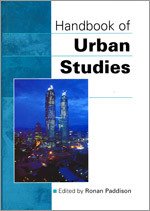
With half of the world’s population residents in them, cities dominate how our economies are spatially structured and restructured, and how social life is experienced. Under conditions of accelerating globalization, cities are the principal intermediaries through which economic growth is sustained and have long been the primary loci through which political control is maintained. Taking a holistic viewpoint, the Handbook of Urban Studies provides a comprehensive appreciation of urban structure and change, and of the theories by which we understand the structure, development, and changing character of cities. Leading authors identify and analyze key issues, within the following sections: -Identifying the City -The City as Environment -The City as People -The City as Economy -The City as Organized Polity -Power and Policy Discourses in Postmodern Cities -Cities in Transition A comprehensive overview of the urban condition, this Handbook will appeal to a wide readership, from academics to researchers and policy-makers. As a theoretically and empirically informed account embracing the different disciplines contributing to urban studies, this book forms a unique and indispensable resource for professionals and researchers in urban studies, urban and town planning, social and cultural geography and public administration, as well as for all those concerned with the role of the city and urbanization in the disciplines of politics, sociology and economics.
Resource collections
- UN Habitat - Urban Response Collection
- Urban Response - Urban Crisis Preparedness and Risk Reduction
- Urban Response Collection - Community Engagement and Social Cohesion
- Urban Response Collection - Economic Recovery
- Urban Response Collection - Environment and Climate Change
- Urban Response Collection - Housing, Land and Property
- Urban Response Collection - Urban Crisis Response, Recovery and Reconstruction
- Urban Response Collection - Urban Resilience